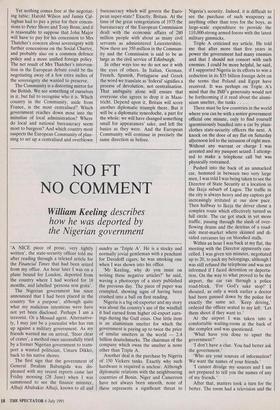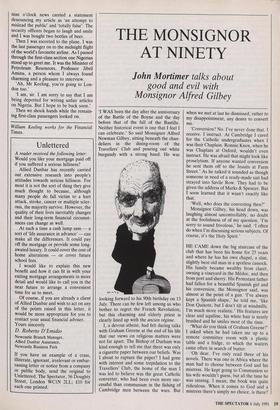NO FT NO COMMENT
William Keeling describes
how he was deported by the Nigerian government
'A NICE piece of prose, very tightly written', the state-security officer told me after reading through a telexed article for the Financial Times that had been seized from my office. An hour later I was on a plane bound for London, deported from the country where I had worked for 18 months, and labelled 'persona non grata'.
The Nigerian government has since announced that I had been placed in the country 'for a purpose', although quite what my malicious intentions were have not yet been disclosed. Perhaps I am a terrorist. Or a Mossad agent. Alternative- ly, I may just be a journalist who has run up against a military government. As my friends warned me on arrival, 'Steer clear of crates', a method once successfully tried by a former Nigerian government to trans- port a wanted politician, Umaru Dikko, back to his native shores.
The first sign that the government of General Ibrahim Babangida was dis- pleased with my recent reports came last Friday morning (28 June) when I was summoned to see the finance minister, Alhaji Abubakar Alhaji, known to all and sundry as 'Triple A'. He is a stocky and normally jovial gentleman with a penchant for Davidoff cigars; he was smoking one when I was shown into his office.
`Mr Keeling, why do you insist on writing these negative articles?' he said, waving a photocopy of a story published the previous day. The piece of paper was crumpled, showing signs of having been crushed into a ball on first reading.
Nigeria is a big oil-exporter and my story was about the country's use of the windfall it had earned from higher oil-export earn- ings during the Gulf crisis. One little item is an aluminium smelter for which the government is paying up to twice the price of similar smelters in the world — 2.4 billion deutschmarks. The chairman of the company which owns the smelter is none other than Triple A.
Another deal is the purchase by Nigeria of 150 Vickers tanks. Exactly why such hardware is required is unclear. Although diplomatic relations with the neighbouring countries of Benin, Niger and Cameroon have not always been smooth, none of these represents a significant threat to Nigeria's security. Indeed, it is difficult to see the purchase of such weaponry as anything other than toys for the boys, as large-scale expenditure to provide the 110,000-strong armed forces with the latest military gimmicks.
Triple A criticised my article. He told me that after more than five years in . power the government had many enemies and that I should not consort with such enemies. I could be more helpful, he said, if I supported Nigeria in its efforts to win a reduction in its $35 billion foreign debt on the terms that Poland and Egypt have received. It was perhaps on Triple A's mind that the IMF's generosity would not be forthcoming if it read about the alumi- nium smelter, the tanks . . . .
There must be few countries in the world where you can be with a senior government official one minute, only to find yourself ignominiously bundled into a car by plain- clothes state-security officers the next. A knock on the door of my flat on Saturday afternoon led to the intrusion of eight men. Without any warrant or charge I was arrested and my passport seized. I attemp- ted to make a telephone call but was physically restrained.
Pushed into the back of an unmarked car, hemmed in between two very large men, I was told I was being taken to see the Director of State Security at a location in the Ikeja suburb of Lagos. The traffic in the city is always heavy and my captors got increasingly irritated at our slow pace. Then halfway to Ikeja the driver chose a complex route which effectively turned us full circle. The car got stuck in yet more traffic, passing through the slush of over- flowing drains and the detritus of a road- side meat-market where skinned and di- vided carcasses lay on bloodied stalls.
Within an hour I was back at my flat, the meeting with the Director apparently can- celled. I was given ten minutes, negotiated up to 20, to pack my belongings, although I was still refused the telephone and was not informed if I faced detention or deporta- tion. On the way to what proved to be the airport, the car ran through a police road-block. 'For God's sake stop!' I shouted, as only a week earlier a doctor had been gunned down by the police for exactly the same act. 'Keep driving,' ordered the officer seated to my left. 'Let them shoot if they want to.'
At the airport I was taken into a comfortable waiting-room at the back of the complex and was questioned.
`What have you done to upset the government?'
'I don't have a clue. You had better ask the government.'
`Who are your sources of information? We want the names of your friends.'
I cannot divulge my sources and I am not prepared to tell you the names of any of my friends.'
After that, matters took a turn for the better. The room had a television and the nine o'clock news carried a statement denouncing my article as 'an attempt to mislead the public' and 'totally false'. The security officers began to laugh and smile and I was bought two bottles of beer.
Then I was escorted to the plane. I was the last passenger on to the midnight flight of the world's favourite airline. As I passed through the first-class section one Nigerian stood up to greet me. It was the Minister of Petroleum Resources, Professor Jibril Aminu, a person whom I always found charming and a pleasure to interview.
`Ah, Mr Keeling, you're going to Lon- don too.'
`I am, sir. I am sorry to say that I am being deported for writing unfair articles on Nigeria. But I hope to be back soon.'
Then we shook hands while the remain- ing first-class passengers looked on.
William Keeling works for the Financial Times.



















































 Previous page
Previous page